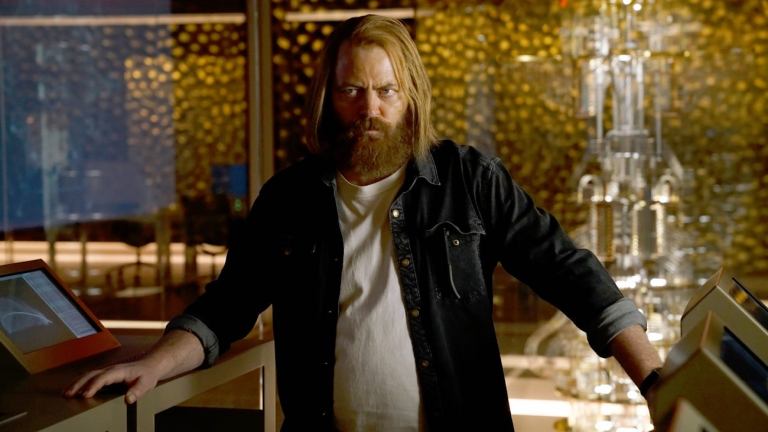Devs: Alex Garland on Ex Machina Connection and Predetermined Endings
Alex Garland discusses the Devs series finale with us, his thoughts on the final revelations, and that Ex Machina easter egg...

This article contains major Devs spoilers.
Tech company CEOs always think they’re messiahs. At least that’s what poor Jamie (Jin Ha) suspected on Alex Garland’s Devs, and it’s what Garland believes too. After all, Devs is a companion piece for its creator and his cinematic directorial debut, Ex Machina, and in both fictions, a tech CEO attempts to rebuild the world in his own image. Now after the Devs series finale, that link has become explicit.
The duality was spelled out when protagonist Lily (Sonoya Mizuno) and tech CEO Forest (Nick Offerman) have their heart-to-heart. Confident and assured in his knowledge of the universe running on predetermined rails, Forest is smugly magnanimous underneath his beard and Jesus Christ styled hair. He lays out for Lily that the world turns on a deterministic model of cause and effect, and no matter what she thinks about the illusion of free will, she is going to shoot him in the face about five minutes from now.
“I’ll tell you a secret Lily,” Forest then adds, “I’ve been wanting to tell someone for a while. The name of the project, it’s not Devs. The V is Roman, so actually a U.” In other words, this whole time the Devs team has really been the Deus team, the Roman word for God. “It was just a private joke.”
It’s also a hell of an easter egg for Garland and science fiction fans. By revealing the name of the series to be Deus instead of Devs, Garland forever links his first series with his first directorial effort, and completes the phrase “Deus Ex Machina.” The term is Latin for “God from the Machine,” and it’s a literary device where an inexplicable act of seemingly divine intervention offers salvation and a happy ending. So of course we had to bring that up to Garland when we chatted last month.
“For me, it was almost exactly as Forest presented in the show,” Garland says. “It’s like a private joke. It just made me laugh that these two projects were doing something like they’re two sides of the same coin. It completed the phrase with two projects that have often complemented each other.”
But even as complements, there are key differences between the film and television series, just as there are between Forest and Ex Machina’s Nathan (Oscar Isaac). In the 2015 film, Nathan definitely has a messiah complex, even manipulating the words of employees so that for posterity it’ll sound like they fawningly said, “You’re not a man, you’re a god.” But Nathan is undeniably a genius. He began building the fictional company of Blue Book (think Google) at the age of 13 when he wrote the search engine’s code. Now in his 30s, he becomes a modern day Frankenstein by building in his own home the first general artificial intelligence–an AI that is self-conscious and able to learn new skills and concepts like a human intellect. By contrast, Forest is perhaps a more realistic CEO. As one character in Devs says, “Forest isn’t a genius; he’s an entrepreneur.”
Explains Garland, “The real point of connection to me was that [in] Ex Machina, we have a man acting as if he was God. In Devs, you have a man attempting to create God. It was two sides of the relationship with God.”
Still, we could not help but muse if the two projects are connected, could they be occurring in the same universe? Maybe there’s at least some place out there in the multiverse, as per Lyndon’s Principle, where Nathan and Forest met at a Bay area tech conference?
“Actually, they almost certainly would have,” Garland laughs before noting “Deus Ex Machina” primarily operates as a joke. But he adds, “They’d hate each other. Forest is not a genius. Nathan would view Forest with a high degree of contempt, and Forest would think that Nathan is barking mad.”
It’s fun to ponder since, as we unpacked in our larger interview, Garland believes the cults of personality that crop up on tech campuses are scarier than any actual technology they invent.
“The thing that interests me is we keep treating entrepreneurs as if they’re geniuses,” Garland explains. “It’s like we’re all trying to drink the Kool-Aid. They’re serving it and we’re desperate to drink it. For me that’s the traffic jam rather than a phone or the messaging app, or the social media app.”
They also create a fertile ground for heady sci-fi ideas like proving (or disproving) determinism. Take the ending of Devs. If everything is cause and effect, then everything that has happened or will happen has been predetermined by preexisting events and influences. “Life is just something we watch unfold like pictures on a screen,” Forest tells Lily. For a man who lost his daughter due to a split-second car crash, it’s comforting stuff. There was no way to prevent the freak accident that ruined his life, right? And that means using the Deus machine to watch projections of her (or a version of her) from years ago is just as good as having her in his arms. Yet Lily immediately challenges that belief. Since the machine shows that she will kill Forest in a few minutes, she’ll instead throw the gun away.
Even though Forest and Katie (Alison Pill) have been utilizing the Deus machine’s apparent fortune-telling properties for months, it would seem Lily is the first to go against its probabilistic predictions. Did Forest or Katie ever even try?
“No, they didn’t,” Garland says. “The reason they didn’t was because they took a position a bit like priests in religion, which is they didn’t challenge what they believe. They just adhered to it. When I was writing it, I viewed Forest as a priest with doubt and Katie like a priest without doubt. There’s a scene where Forest actually suggests what Lily really does, and Katie shuts him down, and in a way refuses to let him try the thing that Lily does, and Forest then acquiesces.”
Garland even views it as a bit of a commentary on religious belief. Be that as it may, viewers were likely as crushed as Lily to learn that even though she made a seemingly free choice, the results were still the same. After throwing the gun away, Stewart (Steven McKinley Hinderson) causes an accident that nonetheless results in Lily and Forest’s deaths.
Says Garland, “You could make the argument that you have either the splitting of the many worlds timeline. But you could also say the universe is continuing to act [the same], and it is just refolding into a deterministic fate once Lily does her action.”
I even run by my own theory, which is that Lily never even had a chance to make a real choice of free will. She only throws away the gun because the Deus machine shows her that she is destined to kill Forest. By refusing to repeat that video projection, she isn’t making a free choice; she’s responding to a cause that affected her actions.
“You absolutely totally could [argue that],” Garland says. “In a way, one of the things the show is offering up is to be discussed, to have that kind of questioning and to allow people to come up with their own answers.”
I still might err on the pessimistic side because, as Garland told us last month, he has real difficulty with free will.
“To me, determinism makes a lot of sense and free will makes less sense,” says Garland. “So I find myself allied on the no free will side, and it’s partly because I don’t see where free will is supposed to reside. I don’t think, for example, probabilistic quantum physics helps or widens [your choices], because a probabilistic outcome is a decision like rolling a dice. It doesn’t mean you made a decision about whether the dice lands on a one or a three or a six. It was just a probabilistic outcome that you didn’t have any effect over.”
Perhaps for that reason, if you want a happy ending, you have to create an illusion that will comfortingly pretend otherwise. Like finding an imaginary Heaven inside the Deus machine with projected versions of Forest and Lily allowed to have their happily ever after. They find God… from the machine. A true Deus Ex Machina.


